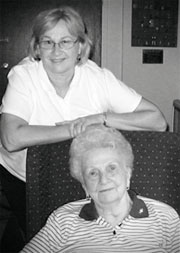 |
|
||||||
|
|
||||||||||||||||||||||||||||||||||||||||||||||||||||||||||||||||||||||||||||||||||||||||||||||||||||||||||||||||||||||||||||||||||||||||||||||||||||||||||||||
|
Virginia Tech's Center for Gerontology stands at the forefront of aging issues; its research helps improve the quality of care and life for people in middle and old age. Research on family relationships, health aspects of aging, and services for older adults offers community members helpful information about a number of challenging situations. Center staff weighed in and shared their expert advice on an issue of growing concern for many people. Don't delay difficult conversations. "I encourage people to be active participants in the planning process, which means [they should] start making plans for old age earlier in life," said Karen Roberto, director of the center. "Make your wishes known and think about what's most feasible for you and your family members." Carlene Arthur, administrative assistant at the center, has firsthand experience with decisions about care arrangements. She and her husband, Doug, have helped Doug's mother, Dorothy Arthur, make plans for her own health care. Last June, Dorothy moved to Warm Hearth Village in Blacksburg so that she could be closer to her son and his wife. "I think [moving to Blacksburg] was the best thing in the world," said Dorothy. She previously had resided in an assisted-living facility in Littleton, Colo., near one of her other sons. Before that, Dorothy had lived in an apartment in Colorado—until three years ago, when arthritis began to affect her knees. "I knew at the time that being in the apartment alone was more than I could handle." Rosemary Blieszner, associate director at the Center for Gerontology, notes that it's helpful to make an honest assessment of one's circumstances. "People need to be open to new options and possibilities. Sometimes people insist that they're going to keep everything the way it has been. Being open to accepting help might keep [someone's] quality of life better longer." Allow time for everyone to adjust. Carlene's mother, Mildred Thompson, who has Alzheimer's disease, also lives at Warm Hearth. Carlene acknowledges that transitions to a care facility can be difficult for family members. "The first six months are pretty distressing. You have to realize that staff [members] are very devoted but have a lot of people to care for. You have to realize that [your loved one] will be well cared for, even if you disagree on some things." Carlene tries to make the new residences of her mother and mother-in-law as homelike as possible by bringing in seasonal decorations for their rooms and organizing family gatherings, such as potluck dinners, at the facility's library, which serves as a multipurpose room and can be reserved by families. "It's very important for caregivers to make sure they take time for themselves," she added, stressing that they need to find a balance between looking after others and living their own lives. Utilize available resources. Local Area Agencies on Aging offer a number of resources and can connect older people with helpful services ranging from Meals on Wheels to transportation to and from shopping centers and doctors' offices. An active care-management model is ideal, involving people in decisions about what help they need and who will provide it. Volunteer programs, such as Friendly Visitors, and government-sponsored or private-pay services, such as homemaker and home-health programs, can offer assistance for those who don't have family help or whose family members live far away. "[The concept] sounds wonderful," cautioned Roberto, "but people willing and professionally trained to do that kind of work are often difficult to find." One concern, Blieszner noted, is that the availability of resources varies from urban to rural areas. Many services—particularly those involving transportation—are scarce in rural regions. "People in rural areas are the most vulnerable to not getting needed help." Make arrangements today for care that might be needed in the future.
"The longer you wait to purchase [this insurance], the more expensive it will be," said Blieszner. "Long-term care insurance can provide coverage for services either in one's own home or in community facilities. Having this resource could enable the person to retain a sense of control and decision-making over care options besides relying solely on family and friends." Along with several of her sons, Dorothy paid into a long-term care insurance policy for more than a decade. "It's an excellent way to know that when you get old, you'll have the money to take care of [yourself]. Unfortunately, there are an awful lot of people who aren't able to [afford the premiums]." The high cost of long-term care insurance makes its purchase difficult for some people. Blieszner, however, noted that there are other options, such as making a deposit to reserve a place at a facility offering different levels of care. "Making plans before care is needed preserves choices and [implies] to children and others that 'It's not your responsibility to work this out for me,'" Blieszner said. Leave your legacy. A significant way forward-thinking people can prepare for the future is to engage in estate planning now. The earlier an individual starts thinking about these goals, the more likely he or she is to achieve them, experts say. "Making an estate plan is your opportunity to leave a legacy with your children or with the causes that you care about," said Steve Clark, director of Virginia Tech's Office of Gift Planning. "It's a good time to consider what you want your estate to say about you. Once you've done that, there are a wealth of resources to help you make arrangements. Attorneys are the most important. Accountants and certified financial planners can also help. Many charities have resources for donors who want to discover ways to make gifts that make the most sense for their circumstances." Confront stereotypes of aging. "We can't make any kind of one-size-fits-all advice," Blieszner said. "We can't just assume that because people have reached a certain age, they'll need a certain level of care." She advocates that the diversity of the older population be recognized. In addition, many people find their interests shifting from their 60s to 70s and 80s. "If you're going to live into your 90s or more, but say you're finished doing things at 65, that leaves a lot of open-ended time. I think people realize that they're going to need to pursue hobbies and other interests to fill their time," said Blieszner. One former elementary school teacher, for instance, continued to serve younger generations by hosting tours for students on field trips to a local utility company. She enjoyed this work because it still involved teaching, but with fewer demands and responsibilities, Blieszner said. Immediately after retirement—Dorothy's husband was a military officer, and she worked from home as a seamstress—the couple traveled around the country, visiting friends they'd made through the military. In fact, she drove until age 82. Now 89, she recommends that "people keep busy." Though her mobility is limited now and she uses a wheelchair, Dorothy still finds meaningful activities to fill her day. "I'm a TV nut," she admitted. "I like 'Law and Order' and game shows and 'Days of Our Lives.'" She continues to do crossword puzzles and writes letters to friends. "Life is a journey, and people's needs and expectations change over the course of that journey," said Roberto. Advanced planning and knowledge of available resources can help both those giving and those receiving care to weather the journey and can perhaps make the inevitable bumps in the road less jarring. Albert Raboteau, a writer for University Development, contributed to this story. |
|
|||||||||||||||||||||||||||||||||||||||||||||||||||||||||||||||||||||||||||||||||||||||||||||||||||||||||||||||||||||||||||||||||||||||||||||||||||||||||||||
|
||||||||||||||||||||||||||||||||||||||||||||||||||||||||||||||||||||||||||||||||||||||||||||||||||||||||||||||||||||||||||||||||||||||||||||||||||||||||||||||
|
Illustration by GABRIELA VALDESPINO '12
|
|
|||||||||||||||||||||||||||||||||||||||||||||||||||||||||||||||||||||||||||||||||||||||||||||||||||||||||||||||||||||||||||||||||||||||||||||||||||||||||||||





